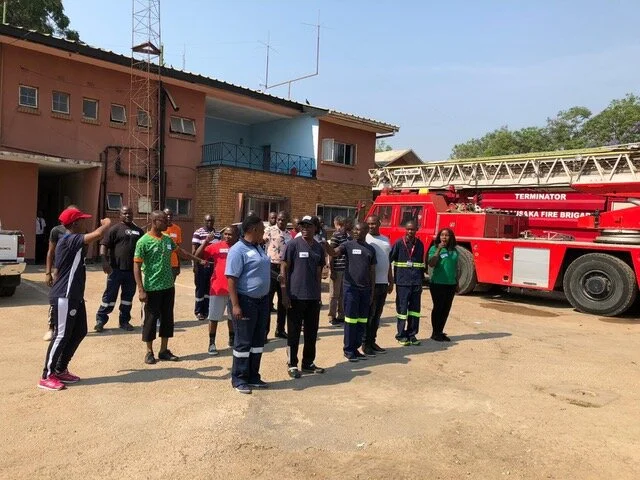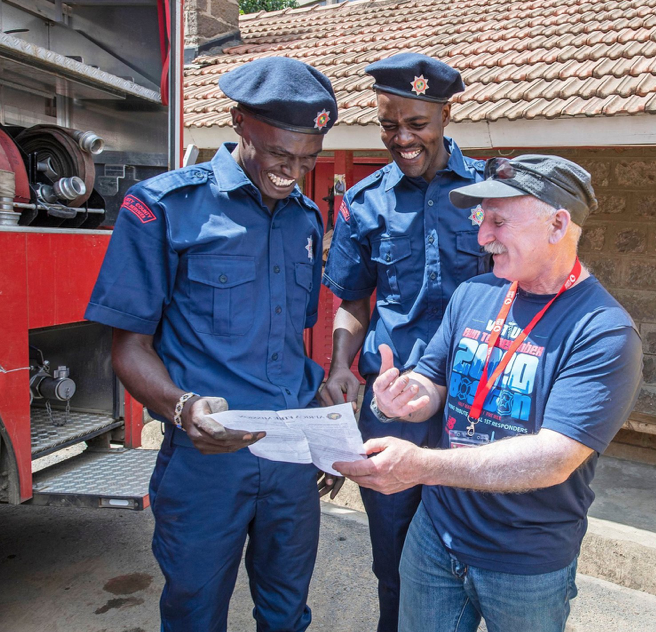Learning how to harness the power of anger in healthy ways is similar to fighting fires. Fire and anger are useful when safely and carefully managed, but extremely dangerous if they get out of control. In firefighting, the goal is to control the fire and manage the environment. In many ways, these are the same goals when dealing with anger. However, anger is about managing ourselves in situations or relationships where we are not getting what we want or need. We can express our anger in unhealthy and destructive ways or healthy and constructive ways that help us get what we want or need. Firefighters learn effective ways to control and manage the fireground. Unfortunately, anger management is not a standard part of firefighting training. This article presents a behavioral model for harnessing anger for healthy, constructive purposes.
Let me emphatically state that anger by itself is not a problem. Anger is a great motivating force for change when used constructively. For example, years ago, my neighbors and I were angry about drivers speeding on our street. So we channeled our anger into a petition for town officials to put in a stop sign on the street to slow down the traffic. The US civil rights movement in the '60s is another example of constructively using anger. Unhealthy anger is often very destructive. A car crash as a result of road rage is an example of destructive anger. It is important to remember that anger is okay when expressed in healthy ways.
A fire occurs when an event causes an ignition. If the conditions are right, ignition leads to the fire spreading, which is called the incipient stage of the fire. The incipient stage is when a situation goes from "there is no problem to something is starting to happen." It is the same with anger. We transition from what I metaphorically describe as shifting from the "Green Light: Everything is Cool" stage to the "Yellow Light: Getting Angry" stage. The psychosocial characteristics of the "Green Light: Everything is Cool" stage include feeling in control of our lives, having fun, feeling confident, good, happy, and relaxed. The psychosocial characteristics of the "Yellow Light: Getting Angry" stage include a growing sense of losing control, power, authority, or freedom, a mix of unpleasant feelings, e.g., sadness, fear, rejection, and so forth, and an absence of fun. Just as there are many different causes of fire ignition, many elements cause a person to become angry.
An important difference between the incipient stages of a fire and anger is that we generally can't know the ignition source until after a thorough fire investigation; with anger, we can and need to know the ignition source before the anger becomes "fully developed." There are many cues when a person has entered the "Yellow Light: Getting Angry" stage, metaphorically similar to the early phase of the growth stage in a fire. Everyone has their cues that they are becoming angry. In addition to experiencing unpleasant feelings, some people develop a quickened pulse, shallower breathing, stomach or headaches, reddening of the face, and nervous twitches. Other signs of becoming angry include being sarcastic, sullen, quiet, restless, loud, tearful, and so on. Sometimes, we aren't self-aware of any of these, but the people around us are. It can be beneficial to ask a trusted friend what signs they see that indicate we are in the "Yellow Light: Getting Angry" stage.
In the life cycle of a fire, the growth stage comes once the fire has established itself and burns self-sufficiently. As firefighters, we strive to catch fire early in this stage; unfortunately, due to the increase in plastics, glues, and hydrocarbon-based products, acceleration from the incipient stage to a fully developed fire happens nearly 8x faster than it used to. When managing anger, we also want to identify and address what propels us into the "Yellow Light: Getting Angry" stage as early as possible. How effectively and quickly we respond to the warning signs in this stage is critical to keeping our anger from turning into "fully developed" anger.
A fire is "fully developed" when it reaches its hottest point and engulfs all the available fuel sources. This stage is the most dangerous moment in a fire's life. The same is true with anger. If we allow our anger to go unabated in the "Yellow Light: Getting Angry" stage, it will rapidly become "fully developed" unhealthy anger. Fully developed anger in this model is called "Red Light: Blow Up/In Angry." Fully developed anger, like a fully developed fire, is dangerous. The big difference is that many safe ways to fight a fully developed fire exist. When it comes to managing our anger, many of us lack the skills needed to keep ourselves in control so that we effectively resolve our conflict. Instead, what we do is often emotionally, psychologically, or physically destructive to those around us. All too often, our actions have negative consequences, which come back and hurt us, too. Some of the psychosocial characteristics of fully developed anger are yelling, fighting, excessive drinking, abusing drugs, self-harm, and reckless driving. I call this stage "Red Light: Blow Up/In" because if we didn't slow down and heed the caution warnings in the "Yellow Light" stage, we would race headlong into the danger zone. While many people use force to express their anger toward others during the "Blow Up/In" stage, it is important to note that others use self-destructive means to channel their anger inward.
Eventually, the fire will enter the decay stage when it runs out of oxygen or fuel to sustain itself. This is true too of anger. When our anger subsides, we enter the "Repair Shop/Cool Down" stage in the anger cycle. Eventually, anger subsides, though there is still a potential for flare-ups in the "Repair Shop/Cool Down" stage, just like in the decay stage of a fire. Generally, the psychosocial characteristics experienced here are remorse, guilt, embarrassment, and sadness at the pain and suffering our anger caused. Often, there are promises that such behavior will never happen again.
Unfortunately, without increasing self-awareness while in the "Yellow Light" stage and using anger management skills, the promises made in the "Repair Shop/Cool Down" stage do not last. In fire service terms, self-awareness is personal situational awareness. Thus, the first skill to develop is to pay attention to how you are feeling, acting/behaving, and what's missing that you need or want. Personal situational awareness means you recognize that you are feeling stressed, annoyed, judged, disappointed, frustrated, hungry, tired, thirsty, and so forth. The earlier we recognize the signs of anger growth, the sooner we can address them. Often, we don't recognize our anger signs, so it can be helpful to ask someone who knows us what they have noticed about us when you are getting angry.
Once we notice the warning signs, we should pause and ask ourselves questions like, "What's wrong? What's the problem? What am I not getting that I need or want?" These questions help diffuse the negative feelings characteristic of the "Yellow Light: Getting Angry" stage. In addition, there are several proven tactical ways to slow down the anger growth process to avoid big blow-ups. These include talking with a friend, paying attention to self-care (adequate sleep, hydrating, food, and fun), exercising, meditating, yoga, journaling, mini vacations/time outs, and deep breathing exercises. These are not problem-solving skills. They are helpful self-control tactics. By utilizing self-situational awareness and one or more tactical skills for managing anger, it is possible to turn the unhealthy anger cycle into a healthy one. Once the anger growth is under control, we can enter the transformed "Red Light: Healthy Problem Solving" stage.
It is important to remember that anger is often a secondary emotion, masking vulnerable feelings like fear or frustration. It is often helpful to identify the deeper feelings manifesting as anger. One way to do this is by asking, "How does it feel to feel angry?" Sometimes, this is doable when we are in the Yellow Light stage or when we are in the healthy Red Light stage. This line of questioning often helps to reveal the unmet needs, wants, or concerns.
Fire and anger share a similar life cycle. Both require skills, tactics, strategies, and an understanding of the underlying dynamics. Firefighters train using their skills, tactics, and strategies in controlled environments, not during actual fires. Unfortunately, most of us wait until we are angry before we practice anger management skills. An excellent exercise is reflecting on past anger experiences in your life. What was physically happening to us as we were becoming angry? How did we react? Were our responses helpful? Reimagine how we responded; only this time, imagine using one or more of the anger management skills described above. Ask a trusted friend what they notice about us when we become angry.
The more self-aware we are (personal situational awareness), the earlier we can identify that "ignition" occurred and that we are entering the "growth" stage of anger. With our increased self-awareness and anger management skills, we can continue onto the "Red Light: Healthy Problem Solving" stage of the anger cycle. Instead of responding in an unhealthy way, we are now harnessing the power of our anger to find a peaceful and meaningful resolution to whatever was the "ignition" or cause of the conflict.









